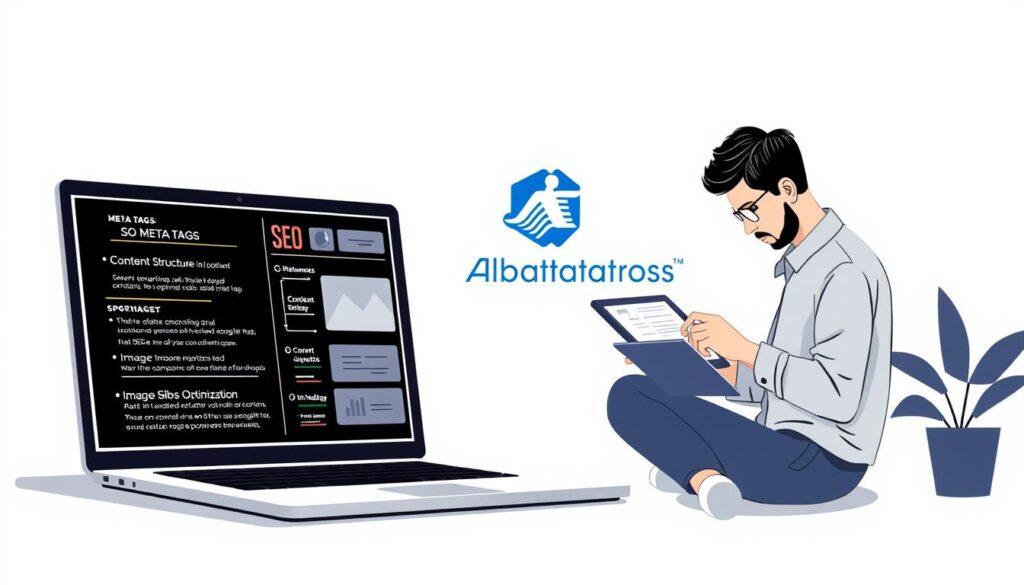In today’s digital landscape, having a strong online presence is crucial for businesses to thrive. Mastering SEO ranking is essential to increase visibility in search results and drive more traffic to your website.
As a leading IT company in Bangladesh, Albatross IT Bangladesh provides expert advice on how to improve your website’s Google search engine optimization. With the ever-changing algorithms, it’s vital to stay up-to-date with the latest techniques to boost your online presence.
Key Takeaways
- Understand the importance of SEO ranking for higher visibility
- Learn expert tips from Albatross IT Bangladesh
- Stay updated with the latest Google search engine optimization techniques
- Improve your website’s online presence
- Drive more traffic to your website
Understanding SEO Ranking Factors in 2023
As we navigate the complexities of SEO in 2023, it’s vital to understand the factors that influence search engine rankings. The landscape of search engine optimization is constantly evolving, with algorithms becoming increasingly sophisticated.

How Google Search Engine Algorithms Evaluate Websites
Google’s search engine algorithms play a crucial role in determining the visibility of websites in search results. These algorithms assess various aspects of a website to determine its relevance and quality.
Core Web Vitals and User Experience Signals
Core Web Vitals have become a key factor in how Google evaluates websites. These vitals include metrics such as page load times, interactivity, and visual stability. Ensuring that your website scores well on these metrics can significantly improve its search engine ranking.
User experience signals, including factors like mobile-friendliness and secure browsing, also play a critical role. A website that provides a seamless and secure user experience is more likely to rank higher in search results.
Content Relevance and Quality Indicators
The relevance and quality of content are paramount in SEO. Google’s algorithms assess whether the content on your website is relevant to the search query, as well as its overall quality. High-quality, engaging content that provides value to users is more likely to achieve a higher ranking.
Content relevance is determined by factors such as keyword usage, content freshness, and the comprehensiveness of the information provided.
Key Metrics That Determine Organic Search Rankings
Several key metrics determine organic search rankings, including the website’s authority, trustworthiness, and the number of high-quality backlinks. Understanding and optimizing these metrics can improve your website’s visibility in organic search results.
Regularly monitoring and analyzing your website’s performance using tools like Google Analytics can provide insights into areas that need improvement.
Common SEO Ranking Mistakes to Avoid
Avoiding common SEO mistakes is crucial for maintaining a good search engine ranking. Mistakes such as keyword stuffing, neglecting mobile-friendliness, and ignoring page load times can negatively impact your website’s visibility.
Staying informed about the latest SEO best practices and algorithm updates can help you avoid these pitfalls and ensure your website remains competitive.
Proven On-Page SEO Optimization Strategies
On-page SEO optimization stands as a cornerstone for achieving higher visibility in search engine results. By fine-tuning various elements on your website, you can significantly improve your search engine rankings and drive more traffic to your site.
Advanced Keyword Research Techniques for American Markets
Effective keyword research is the foundation of a successful on-page SEO strategy. For American markets, it’s crucial to understand the nuances of local search behavior.
Long-Tail Keyword Opportunities
Long-tail keywords offer a more targeted approach to SEO, allowing you to capture specific search queries with lower competition. For instance, instead of targeting a broad term like “digital marketing,” you could focus on “digital marketing services for small businesses in New York.”
Competitor Keyword Analysis
Analyzing your competitors’ keyword strategies can provide valuable insights into gaps in the market and opportunities to outrank them. Tools like SEMrush and Ahrefs can help you identify the keywords your competitors are ranking for.
Content Structure and Formatting Best Practices
A well-structured and formatted content not only enhances user experience but also improves SEO. Use headings (H1, H2, H3) to structure your content, and ensure that your paragraphs are concise and easy to read.
Utilizing bullet points and numbered lists can make your content more engaging and scannable. Additionally, optimizing your images by using descriptive alt tags and file names that include target keywords can further boost your SEO efforts.
Technical SEO Elements That Impact Rankings
Technical SEO plays a vital role in how search engines crawl and index your website. Ensuring that your site has a secure HTTPS protocol is now a given, as Google prioritizes secure sites.

Another crucial aspect is page speed. A fast-loading website improves user experience and is favored by search engines. Tools like Google PageSpeed Insights can help you identify areas for improvement.
Effective Off-Page SEO Tactics to Improve Your Ranking
Off-page SEO is a critical component of a successful SEO strategy, directly impacting your website’s ranking. It involves various techniques that help search engines understand your website’s relevance, credibility, and authority in your niche.
Strategic Backlink Building Approaches
Backlinks remain a crucial ranking factor, as they signal to search engines that your content is valuable and worthy of citation. Strategic backlink building involves obtaining high-quality links from authoritative sources within your industry.
Quality vs. Quantity in Link Acquisition
When it comes to backlinks, quality trumps quantity. A single link from a reputable, high-authority site can be more valuable than multiple links from low-quality sites. Focus on acquiring links from sites with high domain authority and relevance to your niche.
Industry-Specific Link Building Opportunities
Identifying industry-specific link building opportunities can significantly enhance your backlink profile. This can include guest posting on relevant blogs, participating in industry forums, and leveraging partnerships with other businesses in your niche.
Social Media Signals and Brand Visibility
While the direct impact of social media signals on SEO rankings is debated, there’s no denying that a strong social media presence can enhance your brand’s visibility and drive traffic to your site. Engaging content on social media platforms can lead to increased brand mentions and shares, indirectly benefiting your SEO efforts.
Website Traffic Analysis for Continuous Improvement
Analyzing your website traffic is crucial for understanding how users interact with your site and identifying areas for improvement. Tools like Google Analytics provide insights into user behavior, helping you refine your SEO strategy and improve your website’s performance.
By implementing these off-page SEO tactics, you can enhance your website’s credibility, drive more traffic, and ultimately improve your search engine rankings.
Conclusion
Mastering SEO ranking is crucial for businesses to stay ahead in the competitive online landscape. By understanding the intricacies of Google search engine optimization, you can significantly improve your website’s visibility and drive more traffic to your site.
Implementing the expert advice provided in this article, including on-page and off-page SEO strategies, will help you achieve higher rankings in search results. Staying up-to-date with the latest Google search engine algorithms is vital to ensure ongoing success.
Continuously monitoring your website’s performance and adjusting your SEO strategies accordingly will enable you to maintain a strong online presence. By focusing on effective SEO ranking techniques, you can reach your target audience more effectively and achieve your business goals.


